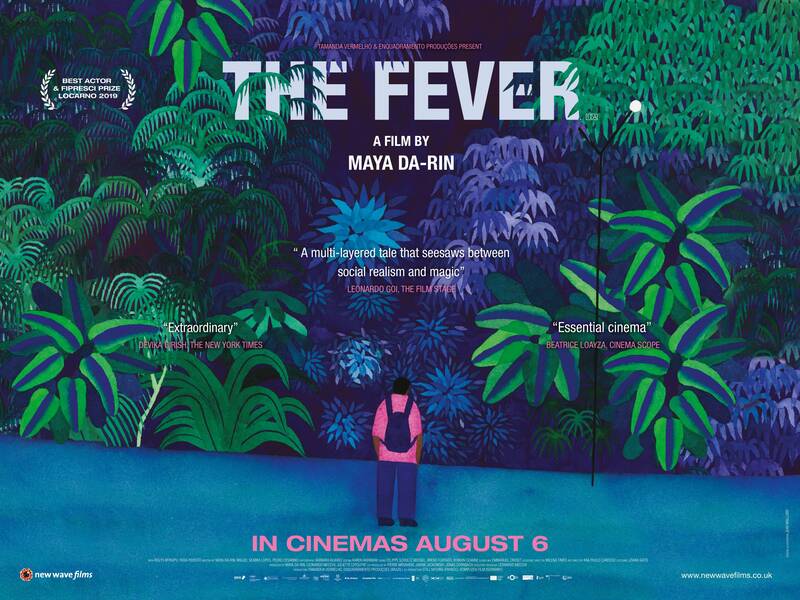
Review by
Eric Hillis
Directed by: Maya Da-Rin
Starring: Regis Myrupu, Suzy Lopes, Lourinelson Vladmir, Rosa
Peixoto

Bang in the middle of the Amazon, Manaus is the largest urban development
in northern Brazil. The link between commerce and the natural environs of
Manaus were forged in the late nineteenth century, with the ‘Rubber Boom’.
This was an economic prosperity which related to the extraction and sale
of rubber from Hevea brasiliensis, a species of tree native to the
rainforest. The boom caused mass European colonisation in Manaus:
attracting immigrant workers, causing cultural and social makeovers, and
inflicting mayhem upon indigenous societies. And then, after enterprising
arborists developed a way of nurturing and subsequently smuggling seeds to
southeast Asia, it all went to shit. From rubber boom to economic erasure
almost overnight, without its USP Manaus fell into depression. In the
1960s, however, attempts were made to bounce back, with the introduction
of the Manaus free trade zone in 1967 attracting business by granting tax
incentives. During this period, Manaus underwent demographic growth to
become one of the most overpopulated cities in Brazil. Today, 17% of the
Amazonas state’s people live below the poverty line.

Maya Da-Rin’s (director and sharing writing duties with
Pedro Cesarino and Miguel Seabra Lopes)
The Fever picks up with one of Manuas’ citizens, the 45 year
old (ancient within the situation of the Brazilian poor’s lower life
expectancy) security guard Justino (Regis Myrupu - beguilingly
inscrutable). Inextricably linked to the city’s industrial milieu via his
job as a security guard at the docks, Justino watches day in and out as
cranes lift and drop shipping containers throughout his long shifts. There
is low level chat with other workers, but essentially the aged Justino
keeps his head down and ekes out his day. After all, there is no
employment protection available to Justino’s role, and plenty of others
who would eagerly take his job. Night times are spent in his shotgun
shack, some way away from the presumably gentrified water fronts. It is a
humble life, one that is without any discernible joy, but also a course
that seems straightforward and relatively unchallenging: an existence as
mundane as it is typical within the colonised, capitalist contexts of
Manaus.
Justino’s daughter announces her intention to move to Brasilia to study
medicine, and this causes our central character to contract some sort of
fever (although completed in 2019, the threat of infection in 2021 Brazil
has urgent connotations...). Could this fever be a psychosomatic response
to his daughter’s flight? In the same way that the strange animal which
reportedly stalks the city streets at night is a very obvious tulpa
conjured by post-industrial malaise?

Although this is Da-Rin’s first narrative feature, she is a veteran of
documentary cinema and boy does it show. The acting is beyond naturalism,
affecting a verisimilitude which seems almost intimate (Myrupu won Best
Actor at the Locarno Festival). It is as if we are actually observing
these humble people knocking about their business, with them completely
unaware of us stroking our chins and contemplating how tough life must be
for them.
I have conflicted responses to this sort of film: on the one hand,
narratives which promote new stories, and which centre on the voiceless is
generally a good and welcome thing. But at the same time, there is the
occasional sense that the marginalised can be objectified in this type of
cinematic study, which only observes from a polite distance, representing
the indigent for the edification of those who at the very least can afford
a cinema ticket or the technology to consume the entertainment product
made about this ‘other’. I dunno. It rests uneasily.

There is certainly a deliberate lack of expansion of Justino’s situation:
at one point, his brother visits and has a pop at Justino for ‘turning
white’. There is no apparent reason for this fraternal jibing as Justino
is almost completely passive throughout, displaying very little
extra-indigenous affectations, or, indeed, much of a personality at all.
The inclusion simplistically reads as a concession to colonialism.
In this spirit, The Fever touches upon a variety of topics
which are worthy of cinematic discourse: identity, cultural erasure, the
environment, the crushing death knell of post-industrial capitalism and
imaginary monsters in the woods. However, the film evades an exploration
of these concepts, and only presents them. There is an imperial stillness
to the tempo and style of Da-Rin’s which some may respond to and welcome
for a change of pace, but, if I’m being completely honest, I couldn’t wait
for this fever to break.

The Fever is in UK cinemas from
August 6th.

